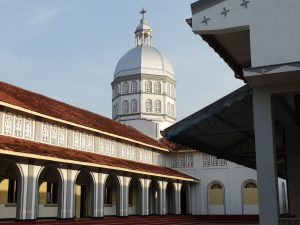On April 1, Catholic Bishop and human rights activist Reverend Rayappu Joseph passed away at the age of 80. Four days later, he was laid to rest at the St. Sebastian Cathedral in the Tamil-dominated northern region of Mannar in Sri Lanka, his funeral attended by a large number of people with many religious and political affiliations. Who was he and why is he highly revered among Tamils in Sri Lanka and among the diaspora?
Born on April 16, 1940 on Delft Island (Neduntheevu) in northern Sri Lanka, he served in the Diocese of Mannar from 1992-2016 and as the vice president of the Sri Lankan Catholic Bishop Conference.
The relationship between Bishop Joseph and the Tamils of Sri Lanka’s Northeast began in the early 1990s when tensions between the Sri Lankan government and the Tamil Tigers were accelerating. He became a vocal human rights activist and a campaigner for justice by openly criticizing militarization in the Tamil homeland and participated in many protests against state atrocities both during and after the civil war. Due to his continued advocacy and campaigns in support of Tamils, he was subjected to abuse and threats, including accusations of favoring the Tamil Tigers by the Sri Lankan government, media, and a number of church leaders.
Prior to the Norwegian peace engagements in Sri Lanka, Bishop Joseph and his Sinhalese counterpart, the Archbishop of Colombo Malcolm Ranjith, were mediating between the Sri Lankan government and the Tamil Tigers from 1991 to 2001. Even after, he frequently urged both parties to end violence and opt for dialogue.
Bishop Joseph also authored several reports detailing the forcible disappearances of Tamil youths and other issues amidst the conflict, while he also witnessed several Sri Lankan army attacks, such as the shelling of the historical Mannar Lady Madu Church in 1999 that killed 37 civilians.
Bishop Joseph was a key witness to the civil war’s final stages in May 2009 at Nandi lagoon that ended with the killing of more than 40,000 civilians. Post-civil war, Bishop Joseph and his fellow Christian clergy decided to appear before the Lessons Learnt and Reconciliation Commission (LLRC), established by the Sri Lankan government — a commission that Human Rights Watch, the International Crisis Group, and Amnesty International described as “fundamentally flawed.”
The evidence submitted by Bishop Joseph to the LLRC is the only document ever published that mentions the exact number of the disappeared in the civil war’s final stages, a shocking 146,679 people.
When everything seemed bleak, Bishop Joseph carried the cause of Tamils, at a time when even leading Tamil representatives such as the Tamil National Alliance were hesitant in bringing the issue further forward. He repeatedly urged global actors to support an independent investigation into the alleged genocide and war crimes against the Tamils, by rejecting domestic investigation mechanisms. In 2014, he wrote to the Sri Lankan President’s Commission on Missing Persons to explain why he refrained from appearing:
I have over the years grown to be weary of domestic mechanisms in resolving serious injustices that Tamil people have faced over the period of the war, prior to it and after its conclusion. Over the years many commissions such as yours have been set up and there is absolutely no shred of evidence that they have tackled impunity. Most, if not all of these commissions have provided only to be eye washers for the then Governments in power.
Notably, since 2009, the United States and its allies have tried to pass resolutions against Sri Lanka in the United Nations Human Rights Council (UNHRC), only to be halted by the vetoes of China and Russia. Despite backlashes against holding Sri Lanka accountable, Bishop Joseph continued his call for an independent investigation until severe illness forced him to retire permanently from public life in 2016.
A week before he passed away, a U.K.-sponsored resolution was adopted in the UNHRC to enhance monitoring and reporting on the human rights situation in Sri Lanka, including on progress in reconciliation and accountability. It has given the Tamil community hope of urging the United Nations to refer Sri Lanka to the International Criminal Court.
Although Bishop Joseph won’t be alive to witness the result of his untiring advocacy, his staunch support to the Tamil community will remain highly revered. His critics argue that he was less sympathetic toward Muslims, and within the church itself, he was considered socially conservative by some, especially on issues regarding women. But the criticisms don’t overshadow his uncompromising fight for rights and justice, which is why Tamil organizations in Sri Lanka and the diaspora have urged the Vatican to canonize Bishop Joseph with sainthood — not for his religious services, but for his humanitarian services to the deprived and voiceless.

































